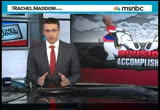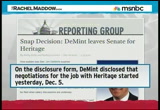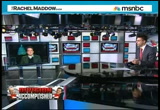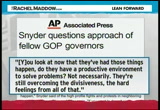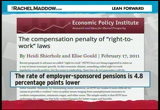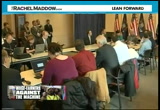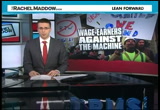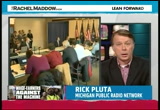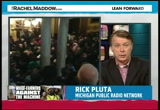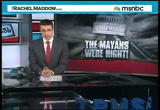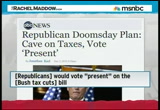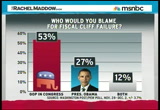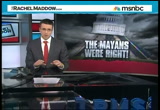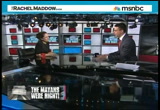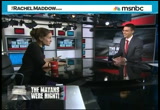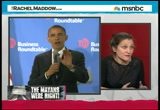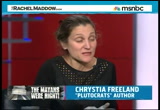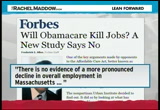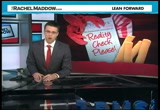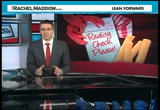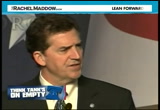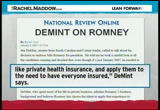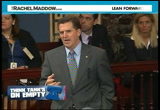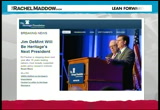tv The Rachel Maddow Show MSNBC December 7, 2012 4:00am-5:00am EST
4:00 am
the lastession of congress was that dealing with companies being incentivized to bring jobs back to the united states. but i guess that's another story. e.j. dionne, great to have you with us tonight. thanks so much. that's "the ed show." i'm ed schultz. the "rachel maddow show" starts right now. ezra klein filling in for rachel tonight. good evening, i'm ezra klein. rachel maddow has the night off. well deserved. we appreciate you sticking around for the next hour on a very, very big night in the news. there is an enormous story about the rights of workers tonight in the state of michigan. it's seriously astonishing stuff. we'll get very deep into it. but there is another equally if not more seismic political story tonight out of washington. and that is where we begin. today will be seen, remembered, as a huge day in the republican party's continuance of war. something really big happened. south carolina senator jim demint announced today he'll be leaving the senate. he'll not be there anymore. he's leaving to head a think
4:01 am
tank called the heritage foundation where he stands to make something like ten times his current salary. yay for jim demint, good money. kind of. it's good for him, but it's really good for his colleague, republican senate leader mitch mcconnell. you see, jim demint is not your ordinary senator. he's like the grover norquist of the senate. he's the guy the other republican senators are really afraid of. and that is because more so than anyone else and definitely more than any other republican politician, demint is behind the tea party strategy of purifying the republican party in the cleansing fire of party primaries. demint created this pac called the senate conservativist fund, a pac he made into a super pac which makes it more super and exists to help conservative republicans beat other republicans. "since 2009 demint has raised more than $17 million to promote promising candidates in an effort to remake the senate not just in a republican image but
4:02 am
in a diehard conservative one." the image of jim demint, even. and he has often done it by going to electoral war with his own party leadership. in the 2012 midterm elections demint threw his weight behind marco rubio in the republican primary for florida's senate race. despite the fact that the national republican senatorial committee and republican leader mitch mcconnell endorsed charlie crist in that race. marco rubio went on to win that primary and that senate seat. demint also backed rand paul in his primary. that was a fight, by the way, that took place in mcconnell's home state of kentucky and mcconnell endorsed the other guy. the not rand paul. but paul won. he won his senate race in kentucky which was deeply humiliating for mitch mcconnell. but demint has also backed a lot of candidates who won their primaries but did not go on to win their general elections. like christine "i am not a witch" o'donnell if you remember her. demint backed the not a witch candidate and she lost big time. he backed todd aiken of the
4:03 am
legitimate rape comments and mourdock of the other rape comments. the reason jim demint isn't in the majority today is because of jim demint. but jim demint says he's okay with that. >> i'd rather have 30 republicans in the senate who believe in the principles of freedom than 60 who don't believe in anything. [ applause ] well, let -- let me make myself even clearer. i would rather have 30 marco rubios in the senate than 60 arlen specters. >> arlen specter you might remember got driven out of the senate in part by folks like demint. he went to the democratic party
4:04 am
and became the 60th vote on obama care. so that worked out well for demint. but demint does rather this being in the minority thing so much that he wants to seven out the rest of his term in the minority. when you're a senator and you even begin talking to another employer about leaving the senate, you have to file this paper with the senate office of public records. they do that so before a big vote on, say, an energy bill that will make oil companies really rich, you can't go to a big oil company and say, hey, don't you think i'd make a good executive vice president who doesn't do anything but makes a ton of money for not doing it? but makes way less money than you'll make if this bill i'm going to be voting on passes? we want to know that kind of thing if it's happening. so you have to file this paper and demint filed his paper only yesterday. according to him, these negotiations began and ended in 24 hours. that is very decisive for leaving the u.s. senate. and if it is true then it's really looking like the heritage foundation and jim demint saw an
4:05 am
opportunity in the continuing republican crackup. earlier this week, we learned that dick armey is breaking up with his tea party group freedom works and then we learned freedom works is kind of crumbling from within due to internal disputes over its strategy. that leaves a mantle of leadership for the tea party wing of the republican party wide open. that is a lot of power and a lot of fund-raising opportunity. and if you believe the timeline of the records, demint and the heritage foundation saw that opportunity whereby they could join forces and seize it and perhaps even become leaders of that wing of the party. now, they're not alone. you know who's leading the other wing of the republican party right now? and also getting a bunch of money? the don't primary all of your incumbents and choose all of your unelectable candidates wing of the party. that is karl rove. here's how rove explained his election experience. >> i was involved in a group called american crossroads.
4:06 am
it's the worst volunteer job i've had in my life. i was in charge of raising money. we raised $324 million, and i got sick and tired of spending money in races where the moderates and the conservatives had gone at each other and made victory impossible. >> rove has said he wants to reorient crossroads and some reporting says he's going to do that by beginning to intervene in primaries where jim demint-like strategies are being carried out. in fact, already even though it has been less than a month since the election, crossroads is coming to the defense of shelley moore capito, thinking of challenging rockefeller in 2014. some have been attacking her as not conservative enough for the seat. crossroads president steven law told politico, quote, it is distasteful to see washington politicos clubbing republican candidates right out of the gate, especially ones with the guts to challenge an entrenched incumbent and who enjoy the broad base of support that shelley moore capito seems to have. or jim demint said he'd rather
4:07 am
have 30 conservative republicans in the senate than 60 who don't believe in anything. karl rove would probably rather have 60 republicans in the senate no matter what they believe. that is going to be the fight. that is the battle line in the republican party right now. the guys who want purity, more tea party, versus the guys who want a supermajority. no more obama cares. heritage versus crossroads. karl rove versus jim demint. pass me the popcorn. joining me, dave weigel of "slate" and msnbc contributor. dave, it is good to see you here tonight. >> good to see you, ezra. >> so is this what it kind of looks like? do you see demint and heritage as consolidating power here and making, and vying for leadership of the tea party wing of the party? >> no, i like the way that you put that. freedom works is going through an awkward patch right now. heritage has actually been expanding into that terrain long before any problems that
4:08 am
occurred at freedom works. heritage in 2010, point out, launched heritage action, 501-c3 which is renting the floor space in the rest of the heritage building and has been aggressively campaigning. during the congressional voting season against republicans, getting them to vote their way on various bills. irritating a lot of people. a lot of libertarians. a lot of moderates. this signals they're going to step that up. it's perfect for demint who has always done this. you haven't mentioned his legislation in your intro because he wasn't much of a legislator. he passed one bill that renamed a courthouse. he had stuff added to other bills. his strategy was to really slowly replace senators over the course of many years. that's what he'll do from the outside. >> right. he didn't so much create legislation as he created legislators. >> right. >> one thing here, his term if i'm not wrong, goes until 2016. it's somewhat atypical for senators to leave in the middle. being in the minority in the modern senate is not super fun and so it's hard to escape the impression here that a minority status that jim demint helped
4:09 am
create led him to leave early. it's like he's fleeing a situation that he brought into being. >> that's astute. if you look at the seats that he had the influence on, people he actually brought into the senate, he did create people in his mold to a degree that i don't think has been -- anyone has done before. but he did it in seats already held by republicans. the one semi-exception as you point out is pennsylvania where, i mean, jim demint in a way, inadvertently, enabled the passage of affordable care act. had specter stayed within the party specter's pattern was to run toward republicans in the primary, run toward the general. it was ineffective. the clip when he talks about 60 senators who don't believe in anything, that's a little bit unfair to republicans like arlen specter. they existed. their vision for the republican party was to compromise on a couple things, build the party on immigration reform, build the party on a medicare part "d," on no child left behind.
4:10 am
all things demint opposed. he succeeded in making republicans elected from places that safely vote republican more conservative. he didn't broaden the party at all. i mean, mitch mcconnell is not just craven. he believes to win the party, can't vote the way jim demint does. jim demint said, well, fine, here's seven people like me. i'll see you. >> one thing i think we sometimes forget when we talk about abstract party principles is something a guy like specter believed is you represent your constituents. and his constituents were not as conservative as jim demints in south carolina, as mitch mcconnells in kentucky and, of course, pennsylvania has been going very blue. that seems to me to be kind of the core argument here. one thing that's happened is these political parties have nationalized in a very big way, and demint's strategy, it appears to me to largely be to nationalize the elections. you have this big washington groups like freedom works or now heritage entering into these primaries that are in districts
4:11 am
for house members and states for senators and trying to get people acceptable to the national republican party even if they're not seriously facility for the district or state they're representing. that seems to me what karl rove is attempting to fight. he's saying, look, you have to have these elections have some local character. >> yeah. newt gingrich used to say, when newt gingrich was more of a wise man outside the party, said the same thing. gingrich endorsed the republican who's a moderate in a special election, and in upstate new york which a lot of people had forgotten, but was kind of the kickoff to this purge of nonconservativeses. then gingrich apologized when the third, you know, the third-party candidate lost with -- it's complicated. basically the conservative might have won had the republican pulled out completely. said, i'm sorry, i'll never do it again. the demint vision for how to bring republicans to bear what they have to believe if they're republicans has spread far beyond places where it is sellable. and, again, the people who disagree with him, they just don't see what he gained for all that opposition.
4:12 am
they saw, you stopped a couple of spending bills, but in the long run, or at least in the next couple years, you just set up a bunch of crisis points where republicans don't have lots of leverage because our message looks like your message and voters reject it. i mean, voters by about a 20-point margin blame republicans now or they will blame republicans if there's a fiscal cliff crisis. >> right. they perspectively -- they perspectively blame republicans for it and in part from folks like demint. dave weigel for "slate" and msnbc contributor. thank you for being here tonight, my friend. >> thank you. lame duck session means different things in different parts of the country. in one state, lame duck means shockingly bold action by the government. a lot of people calling it lame and other people ducking. it's big news and a serious conflict in the state of michigan. and one wedding, 2 kids, 43 bottles of olay total effects and many birthdays later,
4:13 am
4:14 am
4:16 am
there was a group of protesters who we are told by the state police rushed to police officers trying to get into this senate chamber. at that point, the police officers took out chemical spray, pepper spray, sprayed them, and eight people ended up, eight protesters ended up being arrested. and so now there are state police officers out in front of the state chambers, it's similar in front of the house chambers, as they begin to take up this bill. >> that was what democracy looked like today in michigan where the state's republican majority began voting on a bill
4:17 am
that will dramatically curb the -- hundreds of people flooded into the michigan state capitol where the house was scheduled to debate the bill. police locked down the lidding until a local court ordered they open the doors again. the scene in michigan today looked familiar. it looked like the scenes in indiana and in ohio and in wisconsin where those states voted to take away the rights of unions. in fact, it was exactly that kind of scene michigan governor rick snyder, a republican, had said he wanted to avoid. in february, governor snyder looked at those other midwestern states with republican governors and workers protesting in the state capital and decided he did not want that thing in michigan, not in his historically very strong union state. governor snyder said, "you look at now that they've had those things happen, do they have a productive environment to solve problems? not necessarily. they're still overcoming the divisiveness, the hard feelings from all of that." at the time reporters wanted to know whether rick snyder would support what is known as a right to work law. the idea of right to work is
4:18 am
simple. under a right to work law, employees of a union shop don't have to pay union dues. the employees get the benefit of the union, the higher wages and better health care, all of that, but they do not have to pay for it. why pay money if you can have something for free? for unions, the results of this are close to catastrophic which is why republicans and big business love right to work laws. they are a way of destroying unions. the same heritage foundation that will be jim demint's new home says union membership fell by 15% in states that passed right to work. union organizing fell by half, passing a right to work law stops unions and it stops organizing. on the labor left, the economic policy institute reports that wages fall by more than 3% after you institute right to work. and pensions take a hit, too. that's why unions call right to work the right to work for less. with governor snyder saying he wanted no part of a fight over right to work just a few months ago, the move to pass a bill in michigan was, well, kind of surprising. it appears to have started this
4:19 am
year with a referendum campaign by union activists to protect union rights. against governor snyder's wishes, they collected signatures and got a referendum on the ballot that would have made it impossible for the state to pass a right to work law that governor snyder said he opposed. now, or ever. that referendum failed. failed by 16 points. that was november. on tuesday, all of a sudden governor snyder said right to work was on his agenda. how come? quoting "the detroit free press," "there is a view unions must put something on the table if right to work is not to proceed after having gone ahead with a collective bargaining ballot proposal against his urging in last month's election." so this is payback? bargaining? this morning governor snyder held a press conference with republican lawmakers to announce new right to work legislation for the current lame duck session. the governor said he was doing it for the good of michigan's workers. and then the lawmakers explained that they had crafted the bill
4:20 am
in such a way that michigan voters could not put it up for appeal by referendum the way they appealed governor snyder's emergency manager law last month. so good, you can't actually get rid of it even if you want to, voters. republicans then rushed the new language into a vote at the statehouse where it passed by a largely partyline vote of 58-52. just before 5:00 p.m. local time. so depending on how you look at it, the entire legislative process today took about an hour and a half. this evening the republican-controlled senate also voted yes. house democrats are now trying to slow down final passage of the bill and the protesters will likely continue their protesting. both governor rick snyder saying he will sign a right to work bill if republicans want to take away strong unions in michigan. there may not be that much that can stop them. joining us now is rick pluta, capital bureau chief for michigan public radio network. mr. pluta, thank you for being here tonight. >> my pleasure. >> what changed that governor snyder said he was opposed to doing right to work in michigan, moved to on to the agenda and
4:21 am
passed it so quickly? >> well, certainly one of the things was what you outlined was that the unions pushed a very expansive union rights bargaining rights ballot proposal that also would have repealed or threatened a lot of laws that he and other republicans supported. but, yeah, and once it was over, you know, the governor said they'd overreached and really said that right to work might be kind of a comeuppance, regardless of what his wishes are. and he did hold it at arm's length for really a couple of years in order to focus on other things. he said now a lot of those other things have been taken care of and it was time. but there was a lot of push behind the scenes. a lot of big money put behind encouraging both state lawmakers and getting the public behind a right to work legislation, a right to work movement in the state capital. and also just unions and democrats were too slow to come across with some support on
4:22 am
things that the governor wanted to do. you know, just to name one, a rewrite of the state's emergency manager law that was actually repealed by voters in a referendum which this bill won't be once it becomes law. >> what is the response been from unions and democrats in michigan? is there anything they think they can do? >> well, i mean, it's -- this has taken on an area of inevitability. the house and senate approved bills today. the governor said he would sign them. there's no reason to believe that anything will change between now and next week when both the house and the senate will have to take final action on that legislation to get it to the governor. that does not mean, though, that
4:23 am
unions and progressive groups won't be organizing actions and protests to try at the very least call attention to what's going on at the state capital of lansing. they're already planning to what's going to happen after right to work legislation is signed into law in michigan. you know, democrats and unions are talking about things like trying to re-call lawmakers, maybe even some ballot questions that this right to work law, if it does remain referendum-proof, still isn't necessarily immune to the ballot because the unions can go and try and initiate a voter-approved law on their own. a separate law that would basically supersede it. and they could even go back and try and maybe do a cleaner constitutional amendment that would just protect collective bargaining rights and not be as expansive as this last ballot -- a lot of people really saw as an overreach. something that was so sweeping that it just made voters too suspicious.
4:24 am
>> rick pluta, capital bureau chief. thank you for your underground reporting on this. we appreciate it. the thing about most so-called doomsday plans, they have to do with what happens after doomsday. among the current republicans in congress, a doomsday plan means something way different from that. it would be funny if it were not, you know, about doomsday. stay tuned.
4:28 am
prime minister of australia. if that falls through, a tilda impersonator. the top dog, head honcho of australia. she's the prime freaking minister of australia, stood at a podium in front of an australian flag and in a somber tone delivered some incredibly bad news. >> my dear remaining fellow australians, the end of the world is coming. it wasn't y2k. it turns out the mayan calendar was true. the world is about to end. whether the final blow comes from zombies, demomic hill beasts or from the tribe, if you know one thing about me, it is this. i will always fight for you until the very end. good luck to you all. >> wait, wait.
4:29 am
what? control room, somebody needs -- we need breaking news banners. we need your biggest siren. a prominent world leader just said the world is ending, maybe because we're all going to be eaten by zombies. i don't think i'm generally prone to panic, but i'm not very fast, so 28 days later kind of zombies, i find that worrying. oh, wait. okay. i'm told this is a joke. it is delivered with so little vermoof that it is hard to tell. this appears to be a promotion for a morning radio show in australian, a promotion for their end of the world party. prime minister doing your work. that's a good get, australian radio network. the world isn't actually ending, no more than it was a few minutes ago, so far as we know. that is the good news. the bad news is that that was only the second scariest news about doomsday we have for you tonight. the scariest doomsday news is something i will tell you about in a minute.
4:32 am
4:33 am
protect the president and ensure the continued functions of the u.s. government. in the event of a nuclear attack. so nuclear attack, your doomsday happens then you've got your doomsday plan to try to survive it. in 2005, congress passed another doomsday plan meant to ensure the house could function in the aftermath of a terrorist attack that killed or incapacitated most of its members. the rule they passed in the house states that under, "catastrophic circumstances a form would not require 218 congressmen as it does now. rather the house could operate with whoever happened to be around. so, again, you have a terrorist attack, your doomsday scenario, then there's this plan to help you survive it. that is what a doomsday plan usually is. this week, washington is really into another so-called doomsday
4:34 am
plan. but it's a weird kind of doomsday plan. it's not a plan meant to save the country in the event of doomsday. it is a plan meant to create a doomsday scenario in the event that republicans have to compromise on tax rates. on monday, abc's jonathan carl explained how it worked. he said "republicans are seriously considering a doomsday plan if fiscal cliff talks collapse entirely. it would be quite simple. house republicans would allow a vote on extending the bush middle class tax cuts. that bill already passed in august in the senate. and offer the president nothing more. no extension to the debt ceiling, nothing on unemployment, nothing on loopholes. congress would recess for the holidays and the president would face a big battle early in the year over the debt ceiling. ." two republican officials tell me this is becoming the most likely scenario. "the new york times" added more
4:35 am
detail including this amazing quote from rep michael c. burgess of texas. "there's always better ground, but we have to get there." in this case the better ground is exchanging the threat of a congressionally induced recession for the threat of a congressionally induced global financial crisis combined with recession. that, that is your better ground? that's a big plan? it's not -- it's not better ground for the economy. and, frankly, i find it difficult to see how it's better political ground even for the gop. i figured, i didn't get it. so i figured this was beyond my small political brain to understand. so i asked some of my smarter hill republican friends what the theory was here. they told me the idea is while the president can permit the economy to fall over the fiscal cliff, or curb, whatever you want to call it, he can't allow us to default on our debt. that would, like, destroy the economy. that gives republicans a stronger hand or so they think. but really, think about that. here's how it would go. later this month, republicans would, by voting present, which everyone would think was a bit weird, permit the bush tax cuts to expire for income over $250,000. that would let president obama pocket $1 trillion in tax revenue and secure a win on his key priority in the talks. but they would do nothing else. at the end of the year, we would
4:36 am
still go over the fiscal cliff. remember, the bush tax cuts are one of the at least stimulative policies in the negotiations. according to the economic policy institute, extending the middle class tax cuts would wipe out only about 11% of the austerity's economic impact. 11%. but all that other stuff, the payroll tax cut, the unemployment insurance, the sequester, all that, that would still be expiring. so come early next year, the economy would likely be entering an austerity-induced recession. markets would be convulsing as they realize our austerity crisis is about to become also a default crisis. and so the economy, as a whole, is going to be going nuts. poll after poll already shows republicans are receiving more blame for the potential failure of the debt talks. and after telling the press they're going to make a strategic decision to use a debt ceiling as more and more dangerous leverage, they're likely going to get blamed for that, too. and that will be much worse in the polls. republicans may believe the
4:37 am
white house can be so afraid of default that it would simply capitulate. my reports suggests the opposite. that they need to break the gop's habit as using a debt ceiling as a bargaining chip. >> if congress in any way suggests that they're going to tie negotiations to debt ceiling votes and take us to the brink of default once again, as part of a budget negotiation, which by the way we have never done in our history until we did it last year, i will not play that game. because we've got to break that habit before it starts. >> did you see that background behind president obama? it kept saying, business roundtable. the business community agrees with him.
4:38 am
my colleague at the "washington post," greg sergeant, reports, "the business roundtable, the biggest and most powerful business trade groups is preparing to come out to give the president essentially unilateral authority to raise the debt ceiling forever more, ending these crises forever." republicans will have to compromise with the president who will have already pocketed $1 trillion in tax increases. business will be screaming. the economy will be convulsing. they'll be getting blamed. that is supposed to put him in the weaker bargaining position? it's frankly hard for me to see how this strategy gets the gop any of what it wants in terms of policy or politics. this doomsday they are courting, it might be their own. joining us now, chrystia freeland, editor for thompson reuter's digital and author of "the plutocrats: how the rich is getting ahead and the economy is failing everyone else." i think i messed up your subtitle. >> it's okay. you have the cover of the book there. >> it's a great book. i read it. people should read it. i highly recommend it. you've been talking to a lot of business folks. reporting for your book and your everyday reporting. is the business community radicalizing on the debt ceiling?
4:39 am
they didn't take the debt seriously in 2011. they're taking it a lot more seriously in 2012. >> i think that's exactly right. i think it's because of the experience of what happened. you know, and two parts of the experience. first of all, i don't think that people believed america would get so close to the brink. you know, and i heard, remember at the time they kept saying, they'll do a deal, they'll do a deal. the way they behaved was frankly astonishing. the other thing that was a surprise not just for american business but for global business was how powerful the reaction was. and i think actually the greatest reaction was outside the united states. this was the first time that the rest of the world really actually paid attention to the finer points of politics inside the beltway, which actually are profoundly boring for the rest of the world in general. but this was was really the moment in which, you know, if places like beijing and berlin, people started to say, you know what, maybe american political dysfunction is so extreme as to imperil the macrostability of the country. >> does this now actually lead to pressure? i mean, one complaint that the
4:40 am
white house certainly had in 2011 was they talk to these business guys and business guys all said, yeah, this would be a disaster, but they didn't do anything about it. in part because they didn't really believe in it. so the business roundtable coming out for the white house's proposal here seems like a very big deal to me. i mean, are you seeing the beginnings of an actual campaign to pressure republicans to take this threat off to the table, not get to the point where we begin seeing consumer confidence drop, begin seeing businesses cut back, begin feeling those economic effects we got in 2011? >> well, i agree with you this is an important moment, but i think we also have to remember that that hostility that we felt during the election campaign toward obama, that wasn't fake. >> right. >> that was really real, and in a way, you know, the fact that the president won in the teeth of opposition from the super rich and the fact that he is now more insistent than ever on
4:41 am
raising the taxes on the very top, does not exactly endure him to the entire business community. so i wouldn't say that battle is won, but i do think that what you're starting to hear from business is a sense that maybe republicans actually are not better stewards of the economy as a whole. and that's scary. >> is there any evident effect being felt from the president's ongoing ceo tour? since the election, despite the hostility, the feeling of betrayal on the part of the white house, he's been going to business group after business group, having business leaders over to the white house. is that paying dividends?
4:42 am
are people sort of -- is there any calming of those passions because of the diplomacy tour? >> sure. i think it really matters. you know, businesspeople, believe it or not, are human beings, too, and like to be paid attention to. they especially like to be paid attention to by the president. so, yeah, i think it makes a big difference. i do actually think the president is partly to blame for that extreme hostility in his first term because he didn't do some of the basic, you know, meet and greet stuff that actually is the job of a political leader. he's making up a little bit for that now. >> do you think the white house can stand its ground on this? if we get past the fiscal cliff and republicans are attempting
4:43 am
4:45 am
you might remember a couple of times i've been here when i want to do something too boring even for the geeky nerd geeks on the "rachel maddow show" and i love you geeky nerd geeks, made me do it in seconds in a short segment called the ezra klein challenge. tomorrow the monthly job numbers are going to come out. everyone will freak out because they will be horrible. economists surveyed by bloomberg news say as low as 86,000. deutsche bank says could be as low as 25,000. don't freak out. in fact, you should probably ignore this report entirely, at least for now. and i'm going to tell you why in a bit less than 90 seconds. ready, clock? go. first remember what the jobs report it. it is a survey. the first numbers we get, the ones we're getting tomorrow, they're preliminary. they get changed over the next few months as better data comes in. the initial numbers are usually off the first time by about 100,000 jobs.
4:46 am
what's special about this jobs report is the survey was being taken at the same time hurricane sandy hit. transportation was blocked. power was out for a big swath of the country. factories had to stop producing. the economy particularly in the northeast was a mess. there was no way to survey it well. that, the economists say is why their expectations are so low for tomorrow. the good news is the hurricane's affects are reversing and quickly. the number of people filing new claims for unemployment benefits rocketed in the week of the hurricane. last week fell just as rapidly. we will eventually know what happened to the labor market in november. but as my "washington post" colleague neil irwin writes, probably not until december 21st or so when the state by state jobs numbers come out, that we can filter out the states hit by the hurricane and see what's going on in states where the economy was relatively normal. done. whatever the number is -- time to spare. whatever the number is tomorrow, don't freak out, don't worry about it. at least not yet.
4:47 am
4:48 am
do you remember what republicans called their bill to repeal obama care? i do. it was an act to repeal the job killing health care law. now, the whole job killing thing has always been a bit of a talking point myth. a nonpartisan study of the very similar health insurance mandate enacted six years in massachusetts showed, quote, no evidence of reduced employment as a result of health reform there. still, that argument, the whole job killing obama care thing, sent the owner of red lobster and a bunch of other very carb
4:49 am
friendly restaurant chains on a hapless misadventure in corporate protest that culminated today in a public and embarrassing and informative way. back in october, company called darden restaurants announced they were putting more workers on part-time status in stead of full-time to see if they would be able to limit the cost of complying with the new health reform law. under the new law, big companies like darden have to either offer health insurance or pay a $2,000 fine for each full-time employee. over 30 employees who ends up using public subsidies to buy health care. you catch those words there, though? full-time employees or their equivalent. so the thinking went, if you have fewer full-time employees, that equals less money spent on health coverage would equal profit. thus began darden restaurants in trying to dodge obama care. the schemes are kind of unpopular in america. this week the company to lower its earning estimate for next year in part because of the bad press they got for health reform shenanigans. people aren't going for dinner
4:50 am
special. 2 for $25 olive garden dinners are not a good enough deal in post-recession america. today was the end of the line in health reform dodging. their test in using fewer employees, providing them with health insurance, it was a fail. according to the ap's reporting it received a flood of feedback from customers. both employee and customers. turns out everyone is happier when you have healthy full time workers who are not sneezing on your food. the story of the restaurants is a funny story. there is a reason that employers give them health insurance. it is because they need them to be happy and to be healthy and they need people to want to work there. one of the big policy arguments is that once it is fully implemented they will drop the coverage and pay the fine. but do you know what they pay
4:51 am
now? nothing. no fine, no penalty at all. and yet, most provide the health care anyway. we have seen how it goes. it is $295 per employee per year. way less than the $2,000 that you would pay under obamacare. it didn't happen. in fact, since statewide health reform was there, it offers health insurance in the country as a whole. do you you know what kills businesses and jobs? it is losing your workers and getting a reputation as a terrible employer with terrible
4:52 am
service and breadsticks handled by sick people. unless you like sitting back watching the republican party television commercials. yep, there i am with flo. hoo-hoo! watch it! [chuckles] anyhoo, 3 million people switched to me last year, saving an average of $475. yeah, i'm kind of a big deal. [sigh] it feels good to help people save... with great discounts like safe driver, multicar, and multipolicy. 731, 732... you want my number, don't you? call 1-800-progressive right now. or visit progressive.com for an extra $50 online savings. thirsty? 'cause i got a six-pack right here. oh, yeah... [voice shaking] you don't even have to wait for your policy to expire to switch. oh, svetlana, that's so good! and, with every policy, you get great service.
4:53 am
4:55 am
unless you like sitting back watching the republican party tear itself to shreds, you might wonder why a senator would go to a thinktank. but you should care. a lot of the thinking is done by think tanks and this move shows something important and upsetting about the direction that those tanks are taking. but let me tell you the story about the individual mandate. the requirement is the heart of romneycare and obamacare and it
4:56 am
made it's debut in at 1989 payment in the heritage foundation. and stewart butler, the expert argued that it was like a seatbelt and you need to have it like we have auto insurance. the mandate appeared in a health care reform today act. >> 12 years after that. it appeared in mitt romney's plan. and that caught the eye of a politician. he said he he has demonstrated when he stepped into government that he could work in a difficult environment, take good ideas like private health insurance and apply them to the need to have everyone insured. they came up with the idea an alternative and they made it the
4:57 am
law in massachusetts and got democrats to embrace it. for a thinktank that is the dream. today both the foundation and the new president agree that the individual mandate is not just about policy, it is terrible no good constitutional policy. their idea. now horrible and only judged that way until they began endorsing it. flip-flopping to try and make health care reform. i don't want to call it his job, but it is not shocking. it is what you do. but it is not what you do if you are a thinkingtank. his ascension to the head of the foundation is both a perfect match and a disturbing one.
4:58 am
they are where the politicians get their ideas and where the media figures look to get an informed take on whether something make sense or not. their leaders have had one foot in the public and policy world. arthur brooks was recuted from syracuse university. the center for american progress probably the most activist thinktank on the left. heritage has been founded by conservatives who thought the big conservatives began his career at the center of
4:59 am
international studies. before the house conservatives. he's a policies who made his mark practicing a hard edge reform of electoral politics. you don't name him head of the think tank because you are trying to improve your scholarship. it is not necessarily a criticism of him. but that is the shame that is the job that heritage seems to want done. the problem is, place could help reverse that trend. that does it for us tonight and
116 Views
IN COLLECTIONS
MSNBC Television Archive
Television Archive  Television Archive News Search Service
Television Archive News Search Service  The Chin Grimes TV News Archive
The Chin Grimes TV News Archive 
Uploaded by TV Archive on

 Live Music Archive
Live Music Archive Librivox Free Audio
Librivox Free Audio Metropolitan Museum
Metropolitan Museum Cleveland Museum of Art
Cleveland Museum of Art Internet Arcade
Internet Arcade Console Living Room
Console Living Room Open Library
Open Library American Libraries
American Libraries TV News
TV News Understanding 9/11
Understanding 9/11
